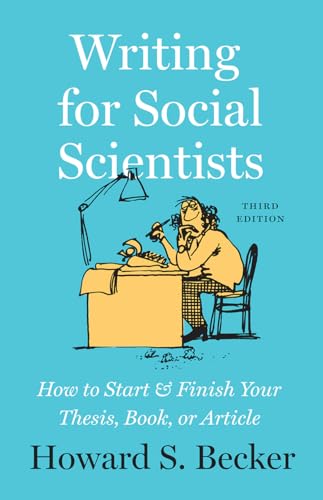Writing for Social Scientists, Third Edition
How to Start and Finish Your Thesis, Book, or Article (Chicago Guides to Writing, Editing, and Publishing)
Howard S. Becker
BOOK REVIEW

In the bustling corridors of academia, where the pressure to publish often intertwines with the angst of self-doubt, there emerges a beacon of clarity known as Writing for Social Scientists. Howard S. Becker, a luminary whose insights have illuminated the paths of countless scholars, combines his rich tapestry of experiences with pragmatic advice that is not merely about writing; it is about forging a confident identity in a world fraught with intellectual uncertainties.
The very title beckons you not to merely reflect but to act: to start and finish your thesis, book, or article. So many of us have experienced the paralyzing grip of writer's block or the agonizing fear of inadequacy when faced with the blank page. Becker understands this torment and confronts it head-on, making you feel like he's taking a seat beside you, whispering words of wisdom that transform your frustrations into a structured journey toward completion.
Delving into the pages of Becker's masterpiece, readers are not just receiving instructions; they are engaging in a conversation. Emphasizing accessibility, Becker distills the art of academic writing into digestible wisdom. His approach dismantles the myth that writing is a solitary endeavor. Instead, he emphasizes it as a social act-one that requires feedback, discussion, and collaboration. This perspective is refreshing; it invokes a sense of camaraderie, reminding you that every sentence penned brings you closer to a network of shared knowledge and revelation. 🤝
But let's cut to the chase: Becker doesn't shy away from the challenges that writers face. He poses poignant questions that provoke introspection: What is it that you really want to say? Are you prepared to defend your ideas? In a world flooded with information, your message must not only be heard but resonate deeply. Becker brutally yet lovingly strips back pretenses, urging you to delve into the heart of your argument. These moments ignite a fervor, a realization that you have a unique voice worth sharing-if only you muster the courage to unleash it.
Amidst the power-packed chapters, the reader uncovers not only practical techniques but also philosophical musings. Becker's narrative intertwines the mechanics of writing with the emotional tapestry of the writer's experience. He draws from a wealth of anecdotes, scrutinizing the missteps and triumphs of well-known scholars, thus humanizing the often intimidating process. The words leap off the page, each one resonating with a truth that hits home. Not just a guide, but a faithful companion nudging you forward, it charms, enlightens, and incites that all-important fire in your belly. 🔥
Within the academic elite, Becker's work has garnered a mixed yet impassioned response. Critics have voiced concerns about its informal tone, arguing that it may undermine the seriousness of academic discourse. Yet, it's this very approach that grants it its charm. Becker is not writing for the pretentious; he is writing for the willing-those eager to learn, grow, and ultimately, share their insights with the world. His simplicity and honesty are, in fact, his strength, creating a bridge over the precarious chasm that often separates knowledge from expression.
Moreover, it's hard to ignore the broader implications of Becker's work. He doesn't just guide you through your individual journey; he places your work within a larger academic context, reminding you of the responsibility that comes with sharing knowledge. The echo of his words transcends individual authorial intent, becoming a manifesto for scholars who yearn not only to write but to impact society. Becker's insights can empower you to become a catalyst for change, contributing to a discourse that reflects the rich complexity of human experience.
In a world inundated with distractions, Becker challenges you to focus, to sift through the noise, and to refine your voice into a tool for transformation. You'll leave with the unwavering belief that your thoughts matter-that they are not just bound for a dusty shelf but are meant to spark discussions, ignite movements, and perhaps even alter the course of a discipline.
Whether you are on the precipice of writing your first thesis, penning an article that could change lives, or simply grappling with the chaotic nature of academic expression, Writing for Social Scientists offers a lifeline. Becker's profound understanding of the writer's psyche resonates like an echo in a cavern-constant, compelling, and undeniably inspirational. It's an invitation to not just write, but to thrive, to engage with the world, and to declare with confidence: I have something to say.
Embark on this journey, and you may find the words that were once just shadows morphing into powerful declarations-transforming not only how others view your work but how you view yourself. 🌟
📖 Writing for Social Scientists, Third Edition: How to Start and Finish Your Thesis, Book, or Article (Chicago Guides to Writing, Editing, and Publishing)
✍ by Howard S. Becker
🧾 193 pages
2020
#writing #social #scientists #third #edition #start #finish #your #thesis #book #article #chicago #guides #writing #editing #publishing #howard #becker #HowardSBecker